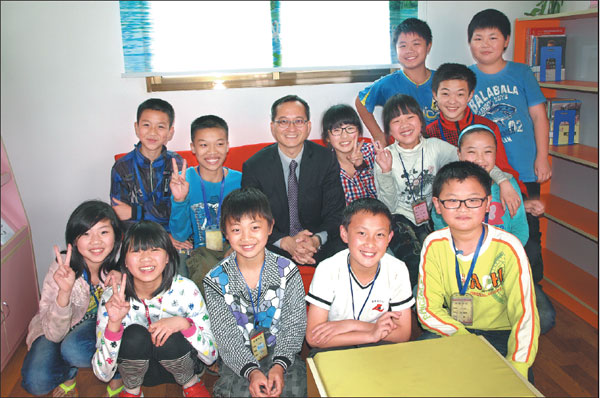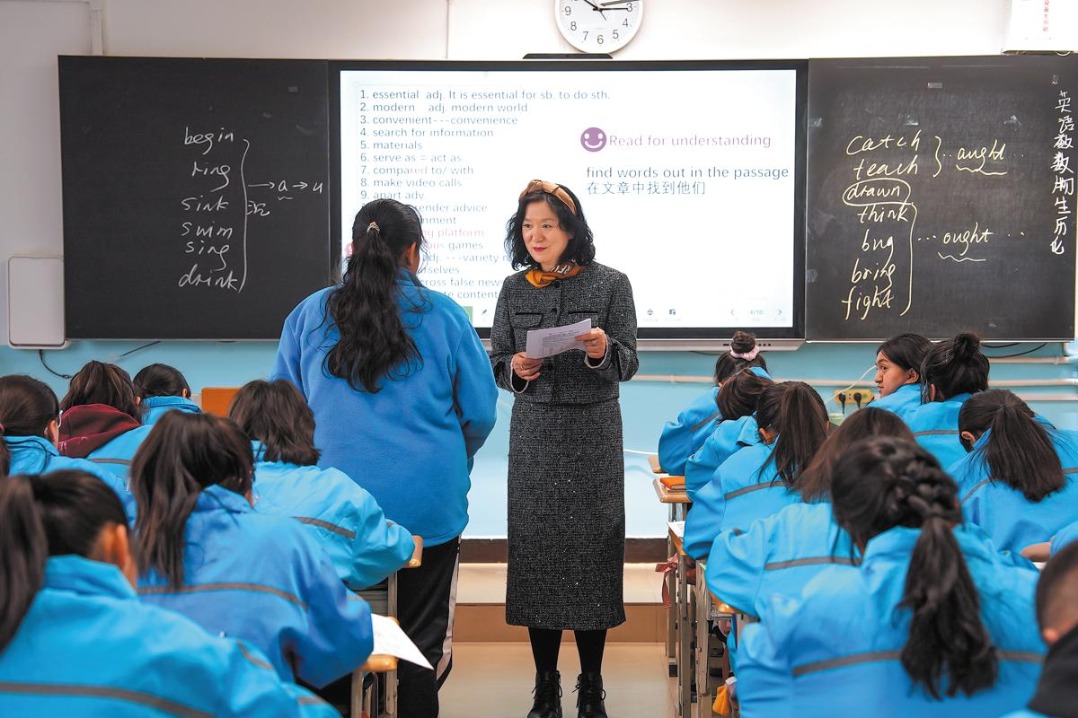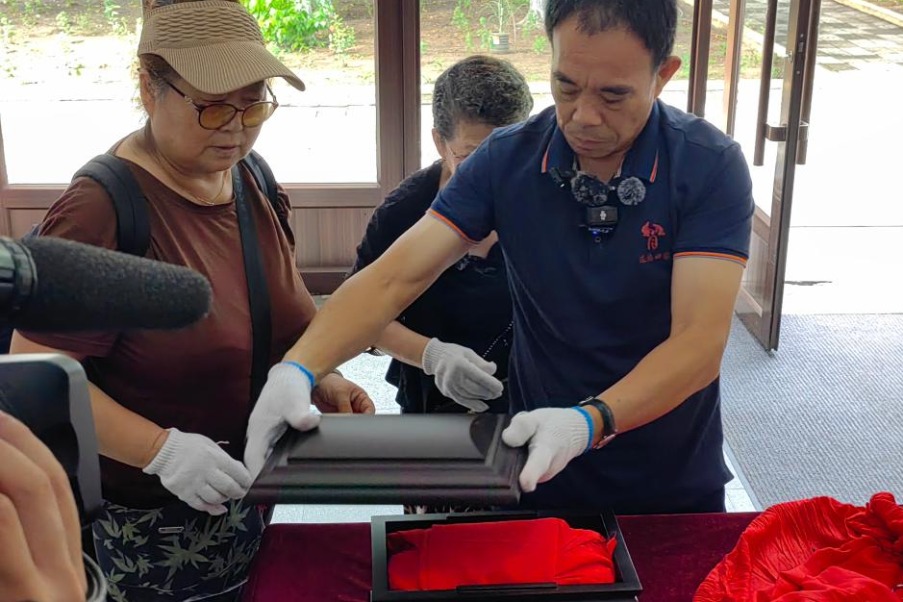Book To The Future

A former headmaster has spent a decade building libraries to improve the prospects of illiterate children in Hunan province, as Wang Yuke reports from Hong Kong.
The children couldn't read. That was the first thing Leung Waiming, a former headmaster from Hong Kong, noticed when he visited a rural school in Shaoshan, a city in Hunan province, in 2007. What possible future could they expect in the modern technological era? he wondered.
When Leung asked to visit the school library, he was taken to a small room - practically a closet - where books sat on a narrow shelf, covered in dust. He was shocked by the apparent indifference to reading.
Talking to the children, Leung realized they were shy and lacked confidence. He also saw that their futures were not promising, given a learning environment so different from their peers in Hong Kong.
"Can I help the school to make a change? What can I do?" he asked himself. Then he had an idea. He would help build libraries for the rural students.
"I remember when I was in Primary 6," one grateful former student wrote to Leung. "We had our own library and it was the first time I read Snow White and the Seven Dwarfs. I took to it immediately. That was the happiest time of my childhood ... Now I work. I hope someday to travel the globe, like the hero of Around the World in 80 Days!"
Letters like that are deeply gratifying to Leung because they represent the perfect outcome of a decade spent promoting reading and building libraries at rural schools on the mainland.
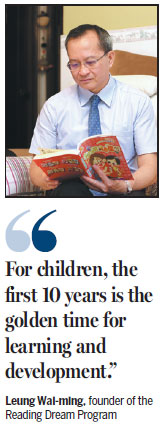
Ten years ago, he started the Reading Dream Program to provide hope of a better future for more than 200,000 impoverished children.
So far, the program has built more than 300 school libraries and supplied books for students for whom reading would otherwise have been an unattainable luxury.
Now, in schools where libraries have been established, reading is the norm.
"Children living in poverty are prone to low self-esteem. They consider themselves inferior to others," said Leung, adding that reading means knowledge and growing intelligence, and intelligence gives children self-confidence and equips them for future challenges, whether in their studies or in life.
"I want to see them walking tall, with confidence and dignity," he said.
Many students from these rural schools used to perform badly in regional or local academic rankings. Now, some have risen in scholastic achievement and have been admitted to top regional secondary schools. Leung's contribution has not been lost on parents, either. They take pride in the children's achievements, and some even donate money to the program to help it expand.
Leung, now 58 and approaching retirement, has always wanted the program to move faster, and can barely contain his impatience. "The school year is quite short for a child. I'm pressed for time to make them aware of the benefits of reading," he said.
A dream blossoms
Leung was headmaster at San Wui Commercial Society School, Sheung Wan, Hong Kong, from 1997 until 2007. Then, after 10 years in the job, he resigned and set off for Hunan to visit an acquaintance, a headmaster from Changsha, the capital of Hunan, he had met during an exchange activity in Hong Kong.
They made a chance visit to the school in Shaoshan, which had about 100 students. The classrooms were crudely equipped; the chairs were unstable and the desks were pockmarked with holes. "It was a mess," Leung recalled.
Even worse, lessons seemed to consist of teachers standing at the front of the class and speaking, while students took notes when instructed or gazed out of the window, daydreaming.
"There was no vigor or fun in the classroom," Leung said. During recess, he noticed that some children were barefoot. When he asked why, the headmaster told him, "Because they are rural children."
The children shied away from Leung, but three girls stared at him with what struck him as vacant grins. "Their stares were empty, even though they looked as happy as children in big cities. I couldn't see hope for the future in their eyes," he recalled.
Many other rural schools were much the same. They had no libraries. Some claimed they had, but when Leung checked, he found the doors locked and the scant book collections covered with dust as though they hadn't been touched for years. Moreover, the books were an eclectic mix that appeared to have been collected at random, with the majority unsuitable for elementary students.
He felt obliged to act. "For children, the first 10 years is the golden time for learning and development. A span of 10 years defines a generation. We can't afford to let a generation fail because of poor education," he said.
Before leaving the school in Shaoshan, Leung promised the headmaster, "I will return before Chinese New Year and help you build a new library."
He then spent two days browsing Shaoshan's only bookstore, looking for children's books. He didn't want used volumes; he wanted new ones "because the 'feel' is important to young readers. The smooth texture and the rustling sound of the paper can make them more interested in reading."
Returning to Hong Kong, Leung began drafting a five-year blueprint. He started knocking on the doors of potential sponsors. It was a slow beginning. Few potential donors were impressed because they thought the project was grandiose and unlikely to succeed.
Some of Leung's friends worried about his personal life and wondered if he would have time for himself after taking on such an enormous responsibility. The lack of a stable income was another concern
Success came slowly, but eventually he found three sponsors in Hong Kong and bought 100 pieces of furniture; desks, chairs and bookshelves. A few days before Chinese New Year 1998, he kept his promise and returned to Shaoshan with 30,000 yuan ($4,570) in his pocket.
Reading the runes
Leung established a 30-minute reading session as a compulsory part of the daily routine. There was also work to be done with the teachers, who had to be competent to teach the children how to read independently.
The students received their new study materials eagerly and were soon absorbed in their new books. "Sometimes they frowned. Sometimes they looked sad and nervous, but as they read on I saw their furrowed brows relax. They smiled and even laughed out loud," Leung recalled. "Their expressions of rapt attention lifted my heart. I felt all the effort had been worthwhile."
He began to see a future for the children - of flexible minds, problem-solving skills, the ability to form opinions, expanded creativity and articulate expression. All these can be shaped through reading, he said, adding that the teacher's role is to "ask good questions "as they guide their students' reading development.
After three months, the teachers saw the results: Students who had only been able to give inarticulate accounts of the stories they read could now relate entire narrative arcs in logical sequences, while the more-advanced students offered their own insights when asked. They all became more comfortable when speaking in class.
Leung set about extending the program to other rural schools in Hunan, but many teachers were unhappy. They complained about the extra workload. The compulsory reading sessions were not implemented, and the time set aside for them was reallocated for students to do their homework instead. Leung's confidence was shaken.
"The schools in those poor villages welcomed donations of books, cash and physical items. They were less interested in reading programs that could take a while to bear fruit," he said.
In frustration, Leung visited the school authorities in Shaoshan, where he received a more enthusiastic reception. He began sitting in classrooms across Shaoshan from 8 am until 5 pm, monitoring the reinstated reading sessions and training teachers.
Loneliness
Away from home, the biggest difficulty he endured was loneliness. When he finished his work, loneliness loomed large and he felt as though he was in the middle of nowhere. "Family and friends were not around. I had nobody to speak to," he said.
Now, he is accustomed to the feeling: "I take a walk and look around, read books or listen to music."
Winter in Hunan was the hardest time in the early days. Leung was a stranger to frequent heavy snowfalls and extremely cold weather. "It's really cold there. My feet were freezing. My toes got numb," he recalled. When he realized the locals wore double layers of pants to keep warm, he followed suit: "For the first time ever, I put on thermal pants and wore two pairs of thick socks."
He didn't eat spicy food in Hong Kong, so he had to adapt to Hunan's fiery cuisine. The schools were hospitable, and they would bring out their best food and liquor. At the time he couldn't bear too much spicy food and was practically teetotal.
"I started to try, out of politeness, and gradually I found myself more comfortable with it," he said.
Fearing his program would be delayed, he kept reminding himself to stay fit: "I can't afford to get sick during my stay in Hunan. I must take care of myself. Eat moderately and keep warm."
Both he and his wife were alone. They have no children, so by spending seven months in Hunan, he knew he was neglecting his wife.
"She would tell me she felt lonely and helpless when she was sick. But she never made a fuss. She just became quiet, which only fueled my anxiety and guilt," he said.
His wife was taken ill with severe stomachaches at night several times, and had to visit the emergency room on her own. In the most serious incident, she needed surgery. "Sadly, I was not with her," Leung said, looking sad.
He also felt for his father and siblings: "My father died when I was heading to Changsha. I should have spent more time with him. He'd had amnesia for many years, and could only recognize two people - me and my oldest sister."
Without a stable income, Leung relies on the support of the sponsors for a "living allowance", as he calls it. "Our family income is half what it was 10 years ago when I was a headmaster in Hong Kong. But it's enough for us to live a comfortable life," he said.
Now, he is desperate to spend more time with his wife and extended family. That wish could be facilitated by a new high-speed rail link between Hong Kong and the mainland, scheduled to open late next year.
At present, he uses the existing rail network as his primary commuting option because it's more flexible than air travel in terms of time, space and cost, and he can use the journey time to work on his laptop.
"Next year, I will be able to catch the high-speed train straight from Hong Kong. It will be much easier," he said. Leung is planning to act as consultant or supervisor and spend more time at home.
He wants to expand the program to more rural schools, so he now trains teachers online.
"I know my wife wants to make a trip to Northern Europe. I've put it in our holiday plan, but only when the job is done and everything has fallen into place. Then, I will really be able to 'go home'," he said.
Contact the writer at jenny@chinadailyhk.com
| Leung Wai-ming sits with students from Yintang Village Middle School, Shuangfeng county, Hunan province. The school is one of 300 in the province that have received books donated by the Reading Dream Program, which Leung launched in 2007.Provided To China Daily |
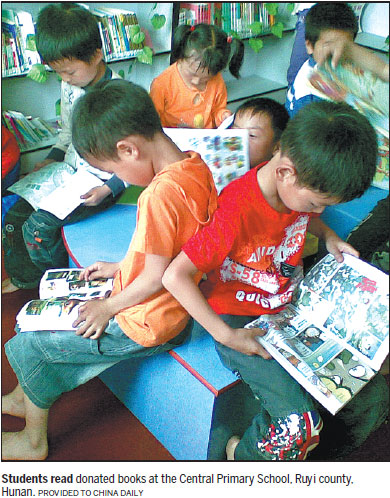
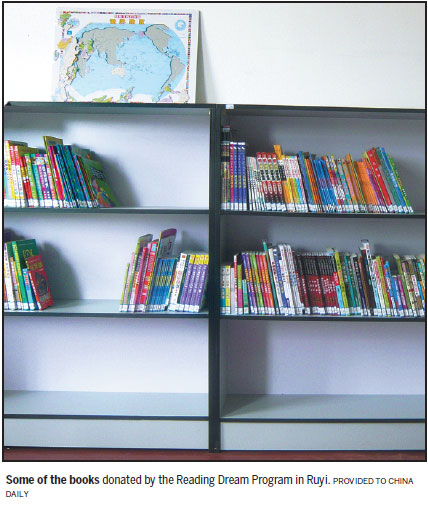
(China Daily 09/21/2017 page6)
- Two South China cities to suspend school, production in response to approaching typhoon
- Dongying advances ecological protection at Yellow River estuary
- Xi extends greetings ahead of farmers' harvest festival
- Baihua Literature Award recognizes 45 works in Tianjin
- Xinjiang's Grand Bazaar delights visitors without travel plans
- Chinese schools blend tradition, technology to energize campus sports
















